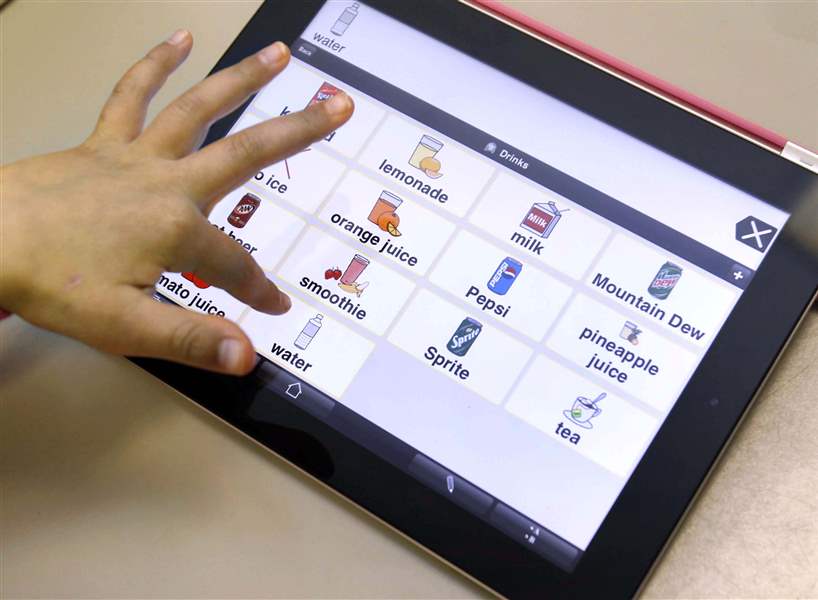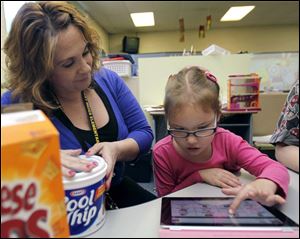
Speech pathologists embrace technology
iPads give little Perrysburg girl a voice
3/30/2012
Joselyn 'Jo' Johns picks a snack using an iPad. Speech pathologists used a $3,475 grant from the Perrysburg Schools Foundation for the iPads.
The Blade/Lori King
Buy This Image

Lauren Miller, speech-and-language pathologist, helps Joselyn 'Jo' Johns, 6, pick a snack during kindergarten at Fort Meigs Elementary School. She began using the device earlier this month.
The little girl sometimes threw herself onto the ground, crying until her face turned purple, because nobody could understand.
Sometimes her teachers, even her own mother, weren't sure what was wrong. And there was no way Joselyn "Jo" Johns could tell them.
The 6-year-old from Perrysburg couldn't speak.
It seemed like a medical mystery, since doctors couldn't give a clear diagnosis as to why the child's brain didn't work quite right or why her facial muscles were not properly developed.
It was a technological device she began to use earlier this month -- an iPad -- that helped the kindergartner finally find a voice.
Figuring out what was upsetting Jo or what she wanted was a guessing game for her loved ones. For Jo, articulating her feelings was like playing charades.
One of the worst incidents was last summer when about 20 friends were in the living room of the Johnses' home in Perrysburg to plan a charity golf scramble.
Jo fell down in the middle of the group, crying hysterically. The meltdown came out of nowhere.
Was the company overwhelming? Was she hurt? Was she sick? Did she need to go to the emergency room?
The room full of mothers couldn't console Jo.
"It literally took 45 minutes of bloodcurdling screams, and the house was evacuated," said Jo's mother, Jennifer Johns, 37, who does marketing for Staples Promotional Products. "All I could do was hold her, and she's curling up in the fetal position."
Turned out, the problem was fixable. Jo's stomach hurt and she needed anti-constipation medicine.
Social little girl
On a recent day, Jo wore a pink ruffled shirt and pink barrettes and bows in her hair to school.
A girly-girl, she was thirsty for compliments from her teachers on how cute she looked. But she had a tomboyish side -- often kicking the soccer ball around or hauling Big Wheels in her wagon.
Even though there were the occasional tantrums, Jo, for the most part, was happy.
Jo had a little boyfriend she saw on weekend playdates.
She was also the kindergarten celebrity at Fort Meigs Elementary School in Perrysburg. She walked down the hall with her hand up in the air to slap high-fives when her classmates said hello.
"She's a very social little girl," said her speech-language pathologist Lauren Miller, 46, of Perrysburg. "She loves people. She loves attention."

Joselyn 'Jo' Johns picks a snack using an iPad. Speech pathologists used a $3,475 grant from the Perrysburg Schools Foundation for the iPads.
Jo clearly understood what people said when they spoke to her.
But she only could make sounds back.
The words she could distinctly pronounce could be counted on her mother's two hands, and her fine motor skills weren't strong enough to use sign language.
"I saw there was a lot she knew, but she had no way to communicate it," said Mrs. Miller, who worked with Jo three times a week.
Jo, classified as having multiple disabilities, was born on St. Patrick's Day.
Ms. Johns remembered the look of awe in the doctors' faces after the delivery.
It was a miracle Jo was alive because her umbilical cord was only 10 inches long, about half of what is considered normal.
Most babies would not have survived in the womb or would have been stillborn.
When Jo was 6 months old, there were signs something was wrong.
Her eyes didn't track the doctor's fingers. The baby, who didn't coo or babble, wouldn't turn to look when someone was talking. Her expression was also strange, like she was in a fog, or scared or confused.
Ms. Johns, a single mother, didn't know more about her only child's condition until Jo turned 4.
"It's heartbreaking when it's your child," she said. "Four years of life not really knowing what's the matter."
The best explanation was that Jo had severe childhood apraxia, a motor speech disorder.
Her brain didn't tell her mouth and lungs how to function right in order to release the air and make sounds to talk.
She also had a weak jaw with underdeveloped facial muscles, and she struggled to string her consonants and vowels together.
Finding a voice
Jo found her voice when the district's speech pathologists started using five new iPads earlier this month after they received a $3,475 grant from the Perrysburg Schools Foundation.
In the high school, for instance, teens with autism are using iPads to watch a step-by-step interactive video to dissect the right way to interact with others, something they normally struggle with, said speech pathologist Liz Gallaway.
Already in Perrysburg schools, hand-held electronic devices are expected to be more commonplace. The school board lifted a ban on iPads, smart phones, and other devices this month to allow students to bring them from home, a move which drew ire from several parents who feared it might be a distraction in the learning environment.
In the middle of class snack time with crumbly cookies, rice cakes, and Cheez-It crackers on the table, Jo is deciding what she wants to eat by scrolling on the iPad screen.
Buttons on the screen show pictures and words for different foods.
Jo pressed tomato juice.
We don't have any, Mrs. Miller said.
Jo, playing the class clown, pressed the button quickly several times in a row. She threw her head back and laughed with her teacher.
The little things help Jo be more like her classmates -- to say what color she wants, to ask for scissors during art time, to say if something is bothering her, or how she feels.
Mrs. Miller can relate to Ms. Johns better than most teachers. She also has a special-needs daughter, Madison, 17, a sophomore at Perrysburg High School.
Many parents worry about how their disabled children will get better by focusing too narrowly on academics, Mrs. Miller said.
"In the end, it does not matter how much you know or don't know about social studies, or math, or science, or anything," the speech pathologist said. "If you can't communicate what you know, it doesn't matter. ... No one will know what you are capable of if you can't communicate it."
Contact Gabrielle Russon at: grusson@theblade.com or 419-724-6026.